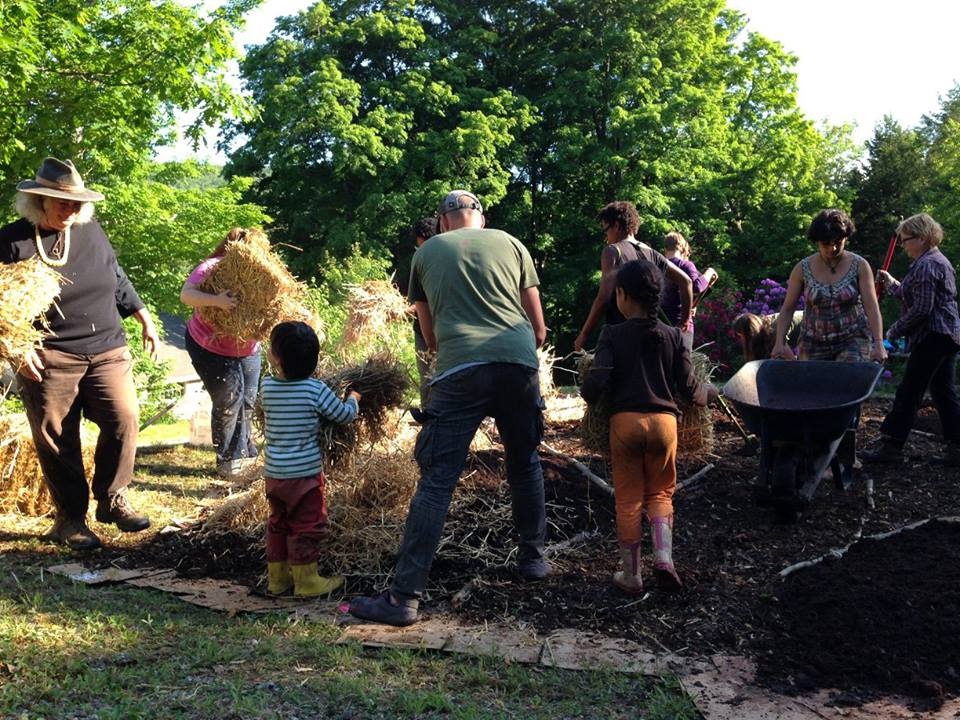I Knew the ‘How’…but Needed to Learn the Ways
By Adamaah Grayse, Perlman Place Production Assistant
I blew back into Baltimore in early April fresh from a two-and-a-half year hiatus, during which I attended a farmer training program at Truly Living Well in Atlanta, GA. While spending time with my cohort of fellow new farmers in their various gardens, farms, and farmers markets, I learned exactly what I set out to: how to market produce and sell organic produce. Mission accomplished!
I applied for the Production Assistant position at Real Food Farm because it was clear that I needed more time in the field, to ground myself in the day-to-day practice of not just growing food but also running a farm. (This includes so much more than a person running around with a pitchfork!) While moving through farming circles, I heard the catch phrase ‘Permaculture’ mentioned, but figured I would investigate it at some point in the future when I had the time and could afford to take a class or two. Well, blessing do come our way every once and again if we keep moving forward! Through a friend, I learned about a two-week Earth Activist Training taking place up at a camp in Western Massachusetts where I could learn about permaculture. Diversity Scholarships were available, and since on of my life’s philosophies is ‘nothing beats a no but a try,’ I applied. AND I GOT IT!
With the support of AmeriCorps and the RFF team, I was granted the time to go and learn. I thought it would be a partial mini-vacation since it wa sbeing held at a camp, but I was sooo very mistaken! Our schedule was from 9am until 10pm every day. We had to walk up a steep hill to class several times a day, make it back to the farm house for all meals, and walk up another steep hill in the other direction when going to work on our group projects. Because I had a scholarship, I was also the afternoon Kitchen Clean-up Manager (the kitchen was an industrial kitchen that fed 70-100 each meal) which meant additional hustle. We got just one Sunday off so we could go into town and do laundry. So I did…and then slept. But in between all of that hustle, I learned why permaculture is such a big deal. And now I thoroughly embrace it.
Patrick Whitefield defines it as the art of designing beneficial relationships. One of our instructors used this example: instead of putting up a fence to keep neighboring children out of her yard, she grew beautiful roses that were well thorned and created a hedge they weren’t too eager to tussle with. Physical beauty, wonderful scent, boundary line, and a wind shear all in one! The three core ethics we learned are as follows:
- People Care: Will this design take care of the people i.e. food producers, homeless, foods that a particular community prefers to eat?
- Earth Care: Does it support life on the earth?( i.e. composting, conserving water, etc.)
- Fair Share: Does it create a returning surplus for future use?( i.e. planting perennial fruit trees, supporting biodiversity)
With these core ethics and the Permaculture Principles (which for brevity’s sake I will not go into), we set about learning how to design water catchment systems, build cob benches, plant using polycultures, zones, renewable energy technology, bioremediation, and many others. I think hit the ‘training wall’ on the tenth day and could not scribble another paragraph. There was no room to take in any additional information! We worked in teams to create Permaculture designs for the different areas of the camp, and we presented them on the last day to the Camp’s management, for which they were very grateful.
 Along with physical permaculture, we also tackled social permaculture with an activist named Starhawk who grounds her teaching of permaculture in the ability of the people to use it not only to heal the land but to heal the community that occupies the land as well. The Diversity Scholarships given were to ensure that diverse voices were in the room, and real conversations could take place across race, gender, social, and economic lines.
Along with physical permaculture, we also tackled social permaculture with an activist named Starhawk who grounds her teaching of permaculture in the ability of the people to use it not only to heal the land but to heal the community that occupies the land as well. The Diversity Scholarships given were to ensure that diverse voices were in the room, and real conversations could take place across race, gender, social, and economic lines.
The training has left me with an enhanced and widened view of how humans treat the Earth and her resources. I already knew how to grow food, but this introduced me to the tools and methods for why it is important to place certain plants, animals, and things in relation to other plants, animals, and things. I can use permaculture to help restore fertility where there may currently be barrenness. What an awesome gift, and it is one for which I am truly, truly grateful.
About Real Food Farm
Real Food Farm works toward a just and sustainable food system by improving neighborhood access to healthy food, providing experience-based education, and developing an economically viable, environmentally responsible local agriculture sector.
